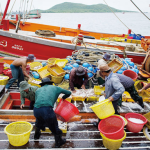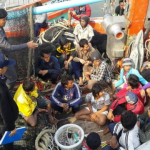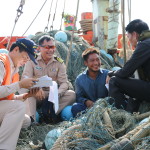
Testimony
By
H.E. Pisan Manawapat
Ambassador of the Kingdom of Thailand to the United States,
on behalf of the Royal Thai Government
Public Hearing for U.S. Generalized System of Preferences (GSP)
Review of Country Practices
14 January 2016, Washington, D.C.
********************
Mr. William Jackson, Deputy Assistant U.S. Trade Representative for GSP and Chair of the GSP Subcommittee,
Members of the GSP Subcommittee,
The Royal Thai Government appreciates the opportunity to speak before your Subcommittee today, and to respond to the AFL-CIO’s concerns.
The GSP has brought many mutual benefits to Thailand and the U.S. But trade is not only about access to market and profits. The Thai Government recognizes that trade has a human face. That human face belongs to the workers whose sweat and labor contribute to the development and prosperity of trading nations. Thailand will, therefore, continue to ensure that the welfare of these workers is promoted and their rights protected.
We do this because it is only and always right. For Thailand to ensure its status as a world-class production hub, we must strive for and achieve the highest international standards in relation to labor.
That is why we are committed to working with employers and employees to combat labor exploitation in all its forms. Mr. Patom Pechmanee, Deputy Director-General of the Department of Labor Protection and Welfare, and Ms. Absorn Krissanasmit, a leading union representative, have traveled from Bangkok to attend this hearing. They will have more to say on this topic of our concern.
The current Thai Government is putting words into actions, especially in strengthening legislation, protecting victims, and going after the criminals in human trafficking, illegal fishing, and child labor.
Because of the nature of this particular forum, I would, however, like to highlight facts and our efforts solely in the area of labor protection.
First, our workers are able to exercise their freedom of association. They can participate in, not just one, but four main forms of labor organization. Besides trade unions, they can also establish and join employees’ committees, welfare committees and unregistered labor organizations.
Second, we are improving our legal framework. The Labor Relations Act of 1975 and the State Enterprise Labor Relations Act of 2000 are being revised by a Tripartite Drafting Subcommittee. The main purpose, as stated in the preamble of the draft laws, is for the laws to be in line with the ILO Conventions No. 87 and 98. Public hearings will be conducted and the ILO consulted before the bills go to Parliament.
Third, we are combatting discrimination and abuse of migrant workers. Relevant laws guarantee equal treatment for Thai and migrant workers alike. The Government is strongly determined to ensure that these laws are fully and strictly enforced. Furthermore, the rights of migrant workers are being protected by vibrant NGOs across the country.
With regard to the 19 cases raised in the AFL-CIO’s petition, the Government has actually resolved each one of them. Most of the cases have been settled, with the rest pending decisions by the courts.
Last but not least, the Thai Government is committed to expanding our partnerships beyond the ILO. We appreciate increasing collaboration with our immediate neighbors, the U.S. and other governments, and look forward to enhancing these relationships in many years to come.
Now, please allow me to give the floor to Ms. Absorn Krissanasmit, President, State Enterprises Worker’s Federation of Thailand.
********************
Testimony
By
Ms. Apsorn Krissanasmit, President,
State Enterprise Worker’s Federation of Thailand, Employee Representative,
Tripartite Working Group and Tripartite Drafting Subcommittee
Public Hearing for U.S. Generalized System of Preferences (GSP)
Review of Country Practices
14 January 2016, Washington, D.C.
********************
Thank you for the opportunity to speak in front of the GSP Subcommittee. As the Ambassador emphasized in his testimony, Thai labor unions, Thai employers, and the Royal Thai Government have developed a very effective working relationship via the Tripartite Working Group. I am part of the Group’s labor delegation, as President of the State Workers and Union of Thailand. Our union is also a member of IndustriALL, which filed a complaint against Thailand at the ILO.
This is the first time that the Tripartite Working Group has been tasked to draft amendments to the Labour Relation Act and State Enterprise Labour Relations Act. This is being done by a tripartite drafting subcommittee, of which I am also a member. The subcommittee is also ground-breaking because of its inclusiveness of unregistered and registered labour organization representatives.
The subcommittee met five times last year. The sixth meeting occurred yesterday. The tripartite drafting subcommittee has already reached agreement on employer-employee agreements and other key issues.
After the Tripartite Working Group and Subcommittee finish their drafting work on the two laws later this year, a public hearing will be held and then the draft will be reviewed by the ILO.
********************




